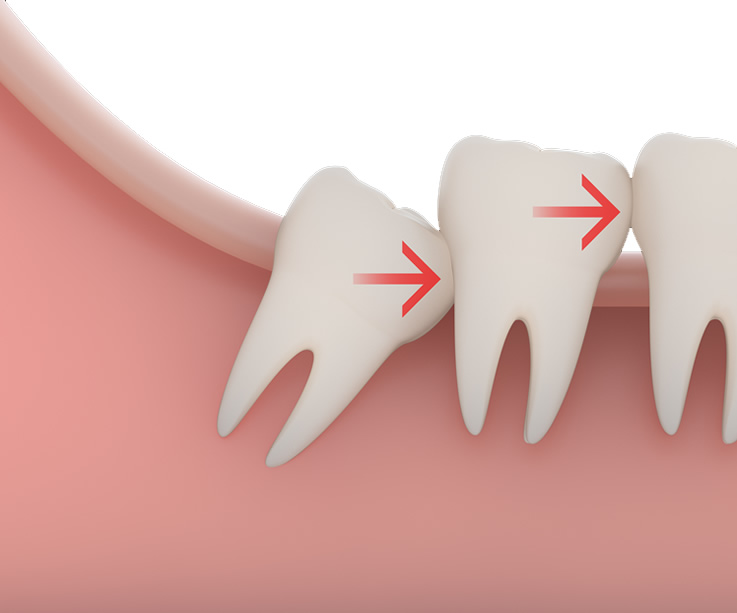Wisdom Teeth Extraction
Wisdom teeth removal is only necessary when wisdom teeth are misaligned and present potential problems. Wisdom teeth are the last teeth at each end of the upper and lower gums at the very back of the mouth and are the last permanent teeth to develop. They usually appear in the mouth generally from late teens or early twenties. Here are some frequently asked questions about wisdom teeth removal.
Do we need wisdom teeth?
Each tooth in the mouth has a specific name and function. The teeth in the front of the mouth (incisors, canine and bicuspid teeth) are ideal for grasping and biting food into smaller pieces. The back teeth or molar teeth are used to grind food up into a consistency suitable for swallowing. Our wisdom teeth are superfluous as our first and second molars are adequate for grinding food.
By the age of eighteen, the average adult has 32 teeth; 16 teeth on the top and 16 teeth on the bottom. Your wisdom teeth, also known as your third molars, are the last teeth at the very back of your mouth. The average mouth is made to hold only 28 teeth. It can be painful when 32 teeth try to fit in a mouth that holds only 28 teeth.
When do wisdom teeth need to be removed?
When your wisdom teeth align properly and gum tissue is healthy, wisdom teeth do not have to be removed. Unfortunately, this does not always happen.
The removal of wisdom teeth is necessary when your wisdom teeth are prevented from properly erupting within the mouth. They may grow sideways, partially emerge from the gum and even remain trapped (impacted) beneath the gum and bone. Impacted teeth may take many positions in the bone as they attempt to find a pathway that will allow them to erupt successfully. Most Dentists and oral health specialists recommend the removal of wisdom teeth, as early extraction will help to eliminate the problems associated with impacted wisdom teeth, such as:
- bacteria and plaque build-up
- development of cysts
- tumour development, infection and jaw and gum disease
- crowding of the mouth and pushing straight teeth out of alignment.
Most people today are advised to remove their wisdom teeth and to do so sooner rather than later, avoiding problems or pain to arise down the track. However you may be one of the lucky ones who do not require this treatment. It is important to consult one of our experienced practitioners to determine this based on your individual needs.
How are wisdom tooth removed?
The relative ease at which your dentist or oral surgeon can extract your wisdom teeth depends on the position of the impacted teeth. Your oral health care provider will be able to give you an idea of what to expect during your pre-extraction examination. A wisdom tooth that is fully erupted through the gum can be extracted as easily as any other tooth. However, a wisdom tooth that is underneath the gums and embedded in the jawbone will require an incision into the gums and then removal of the portion of bone that lies over the tooth. A consultation is required to determine what your wisdom teeth removal would involve.
Will I require surgery to remove wisdom teeth?
General dentists experienced in wisdom teeth removal can perform extractions in the chair. More difficult cases, such as impacted wisdom teeth, will require the wisdom teeth to be removed under oral surgery performed by a specialist oral surgeon and you may require a general anaesthetic. This will be discussed with you at your initial consultation. Any surgical or invasive procedure carries risks. Before proceeding, you should seek a second opinion from an appropriately qualified health practitioner.





